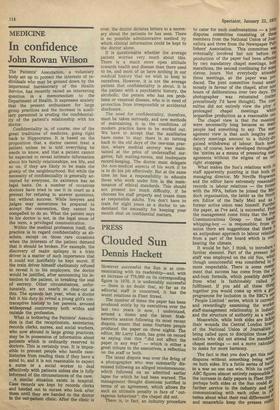PRESS
Clouded Sun
Dennis Hackett
However successful the Sun is at communicating with its readership—and, with an increase of 778,000 on its corresponding figure in 1970, it is undeniably successful — there is no doubt that, so far as its editorial staff is concerned, it has the worst relations in Fleet Street.
The number of times the paper has been produced solely by its executives over the last two years is now, I understand, around a dozen and the latest Stakhanovite session following its most recent dispute, meant that some fourteen people produced the paper on three nights. The editor, Mr Larry Lamb, has gone on record as saying that this "did not affect the paper in any way" — which is either a great tribute to the executives, a reflection on the staff or both.
The latest dispute was over the firing of a photographer who was summarily dismissed following an alleged misdemeanour, which followed on an admitted earlier lapse for which he had been warned. The management thought dismissal justified in terms of an agreement, which allows for such an ultimate penalty in face of 'outrageous behaviour': the chapel did not.
There is, in fact, an industry procedure to cater for such confrontations — a joiet disputes committee consisting of three members from the National Union of Jour' nalists and three from the Newspaper Pub' lishers' Association. This committee Wee eventually involved but not before the production of the paper had been affected by two mandatory chapel meetings, both marathons, the second continuing for sorne eleven hours. Not everybody attended these meetings, so the paper was pro. duced. The joint committee found unani' mously in favour of the chapel, after nirle hours of deliberations over two days. The photographer was reinstated (rather precariously I'd have thought). The coo; mittee did not entirely view the ploy 15," prolonged chapel meetings whie' jeopardise production as a reasonable ale The chapel view is that the meeting', were necessarily long because so mailY people had something to say. The men. agement view is that such lengthy marl' datory meetings amount to a thinly-0' guised withdrawal of labour. Such meet: ings, of course, have developed through& the 'sixties as a means of pressuring men: agements without the stigma of an right stoppage. What makes the Sun's relations with it staff apparently puzzling is that both tbAe managing director, Mr Neville Hopwoeu and the editor have extremely reasonab,le records in labour relations — the fore' with the NPA, before he joined the Met doch organisation, the latter as the North' ern Editor of the Daily Mail and as former active union man himself. Furth' the paper, as I've said, is successful. Frau' the management come hints that the Free, Communications Group — that hauu); whipping-boy — is responsible; from tb„ union there are suggestions that there F, an antipodean approach to labour relatiee' from a part of the board which is ovet heating the climate. It would be fair, I think, to introduce further element. Part of the present Slit staff was employed on the old Sun, Whic, though unsuccessful was considered to more respectable. There is some rese, ment that success has come from the tl' and-bum formula, which possibly detrali from what is fashionably called j4) fulfilment. If you add all these thillgoj together you would come up with a ge programme for inclusion in the BBC's 1180 'People Limited' series, which is currerl and rewardingly examining the worK.,,e'' staff-management relationship in indusc';, and the structure of authority as a whale' Meanwhile, while both sides are 1ic101 their wounds the Central London brany, of the National Union of Journalists.; being called upon to discipline those nalists who did not attend the mandate chapel meetings — not a move calculi& to make for more harmony. The fact is that you don't get this reiedltif disputes without something being virSc; on both sides. It's a futile series of bat''01 in a war no one can win. With its curly' ABC figures almost entirely responsible the increase in daily papers in Fleet Strffi perhaps both sides at the Sun could cirt/i further service to the industry and communicating with each other in terms about what their real differenceS and meanwhile keep the presses raj'










































 Previous page
Previous page